Social Cognitive Theory: Understanding Behavior in Organizations
VerifiedAdded on 2022/09/23
|7
|1934
|32
Essay
AI Summary
This essay provides a comprehensive overview of Albert Bandura's Social Cognitive Theory (SCT), exploring its core principles and applications within an organizational context. The essay begins by introducing SCT, its origins in Social Learning Theory, and its focus on the reciprocal interaction of environment, person, and behavior. It delves into key concepts such as reciprocal determinism, self-efficacy, and observational learning. The paper then applies SCT to a case study involving a hotel rebranding, analyzing how factors like employee frustration, management influence, and organizational culture impact behavior and learning. The analysis highlights the role of personal goals, past experiences, and cognitive skills in shaping individual and group actions. Furthermore, the essay discusses limitations of the theory, such as its focus on behavior and overlooking other factors like motivations or emotions. The paper concludes by emphasizing the importance of SCT as a framework for understanding the psychological mechanisms that influence individual behavior within organizations, contributing to enhanced performance and well-being.
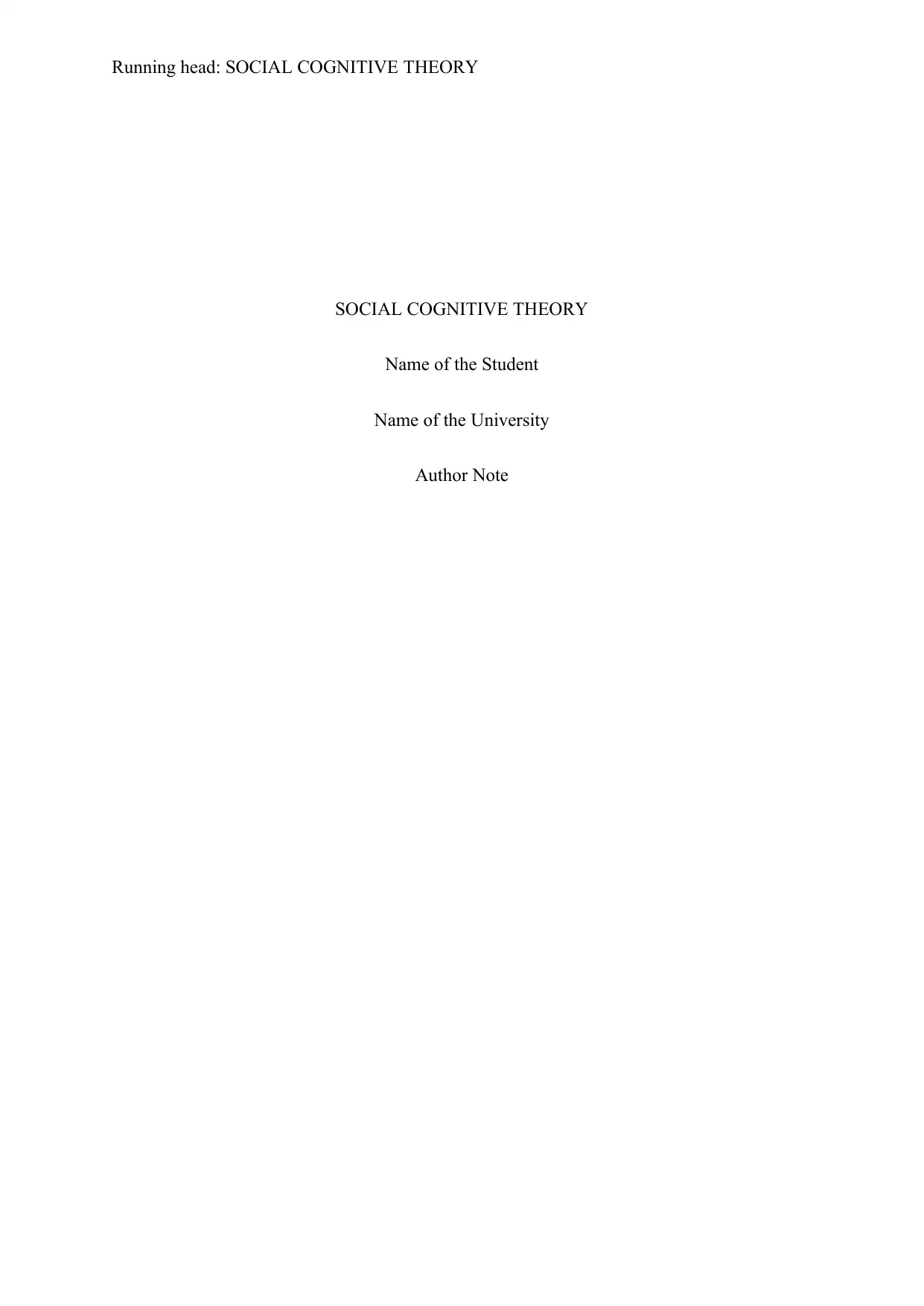
Running head: SOCIAL COGNITIVE THEORY
SOCIAL COGNITIVE THEORY
Name of the Student
Name of the University
Author Note
SOCIAL COGNITIVE THEORY
Name of the Student
Name of the University
Author Note
Paraphrase This Document
Need a fresh take? Get an instant paraphrase of this document with our AI Paraphraser
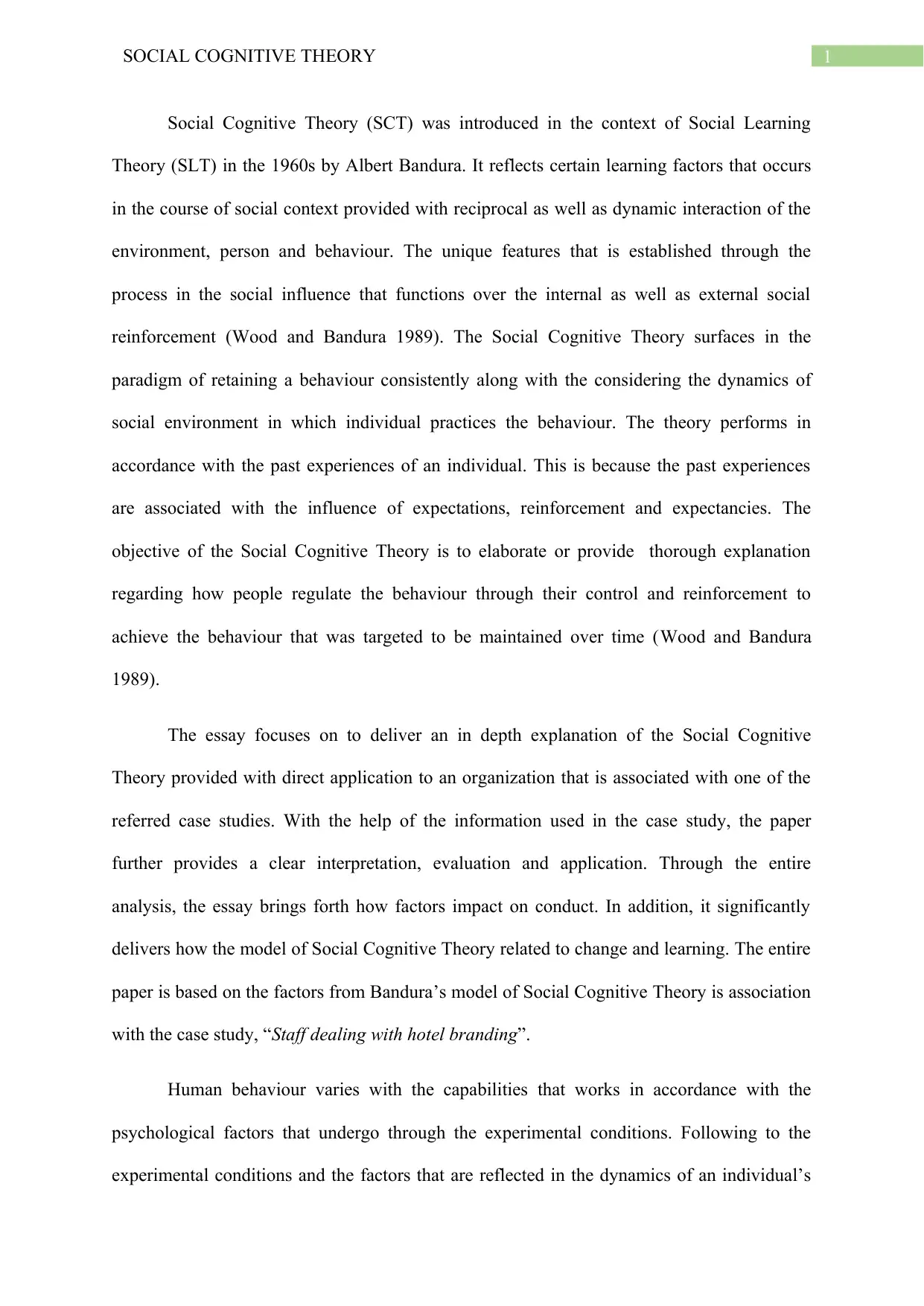
1SOCIAL COGNITIVE THEORY
Social Cognitive Theory (SCT) was introduced in the context of Social Learning
Theory (SLT) in the 1960s by Albert Bandura. It reflects certain learning factors that occurs
in the course of social context provided with reciprocal as well as dynamic interaction of the
environment, person and behaviour. The unique features that is established through the
process in the social influence that functions over the internal as well as external social
reinforcement (Wood and Bandura 1989). The Social Cognitive Theory surfaces in the
paradigm of retaining a behaviour consistently along with the considering the dynamics of
social environment in which individual practices the behaviour. The theory performs in
accordance with the past experiences of an individual. This is because the past experiences
are associated with the influence of expectations, reinforcement and expectancies. The
objective of the Social Cognitive Theory is to elaborate or provide thorough explanation
regarding how people regulate the behaviour through their control and reinforcement to
achieve the behaviour that was targeted to be maintained over time (Wood and Bandura
1989).
The essay focuses on to deliver an in depth explanation of the Social Cognitive
Theory provided with direct application to an organization that is associated with one of the
referred case studies. With the help of the information used in the case study, the paper
further provides a clear interpretation, evaluation and application. Through the entire
analysis, the essay brings forth how factors impact on conduct. In addition, it significantly
delivers how the model of Social Cognitive Theory related to change and learning. The entire
paper is based on the factors from Bandura’s model of Social Cognitive Theory is association
with the case study, “Staff dealing with hotel branding”.
Human behaviour varies with the capabilities that works in accordance with the
psychological factors that undergo through the experimental conditions. Following to the
experimental conditions and the factors that are reflected in the dynamics of an individual’s
Social Cognitive Theory (SCT) was introduced in the context of Social Learning
Theory (SLT) in the 1960s by Albert Bandura. It reflects certain learning factors that occurs
in the course of social context provided with reciprocal as well as dynamic interaction of the
environment, person and behaviour. The unique features that is established through the
process in the social influence that functions over the internal as well as external social
reinforcement (Wood and Bandura 1989). The Social Cognitive Theory surfaces in the
paradigm of retaining a behaviour consistently along with the considering the dynamics of
social environment in which individual practices the behaviour. The theory performs in
accordance with the past experiences of an individual. This is because the past experiences
are associated with the influence of expectations, reinforcement and expectancies. The
objective of the Social Cognitive Theory is to elaborate or provide thorough explanation
regarding how people regulate the behaviour through their control and reinforcement to
achieve the behaviour that was targeted to be maintained over time (Wood and Bandura
1989).
The essay focuses on to deliver an in depth explanation of the Social Cognitive
Theory provided with direct application to an organization that is associated with one of the
referred case studies. With the help of the information used in the case study, the paper
further provides a clear interpretation, evaluation and application. Through the entire
analysis, the essay brings forth how factors impact on conduct. In addition, it significantly
delivers how the model of Social Cognitive Theory related to change and learning. The entire
paper is based on the factors from Bandura’s model of Social Cognitive Theory is association
with the case study, “Staff dealing with hotel branding”.
Human behaviour varies with the capabilities that works in accordance with the
psychological factors that undergo through the experimental conditions. Following to the
experimental conditions and the factors that are reflected in the dynamics of an individual’s
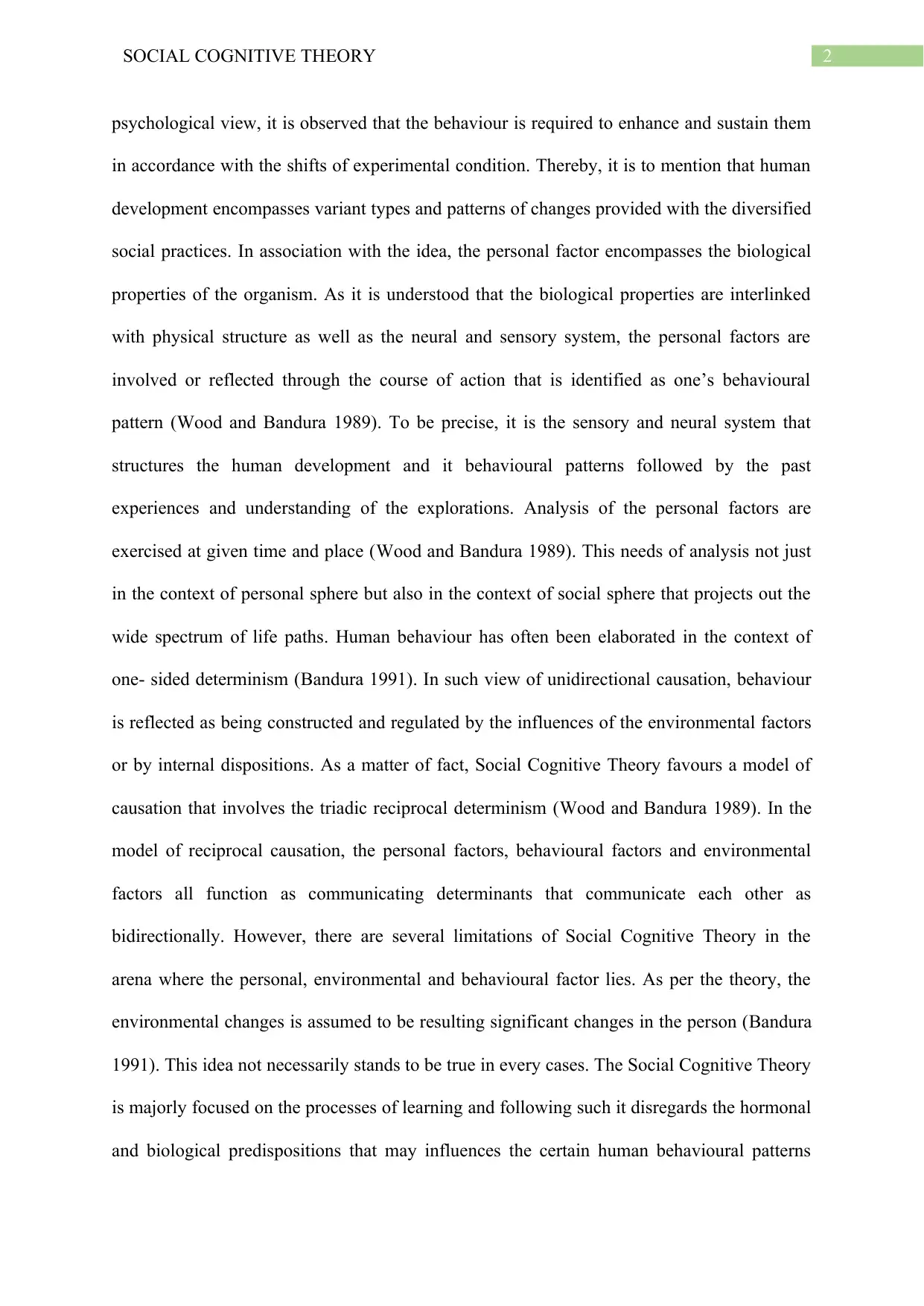
2SOCIAL COGNITIVE THEORY
psychological view, it is observed that the behaviour is required to enhance and sustain them
in accordance with the shifts of experimental condition. Thereby, it is to mention that human
development encompasses variant types and patterns of changes provided with the diversified
social practices. In association with the idea, the personal factor encompasses the biological
properties of the organism. As it is understood that the biological properties are interlinked
with physical structure as well as the neural and sensory system, the personal factors are
involved or reflected through the course of action that is identified as one’s behavioural
pattern (Wood and Bandura 1989). To be precise, it is the sensory and neural system that
structures the human development and it behavioural patterns followed by the past
experiences and understanding of the explorations. Analysis of the personal factors are
exercised at given time and place (Wood and Bandura 1989). This needs of analysis not just
in the context of personal sphere but also in the context of social sphere that projects out the
wide spectrum of life paths. Human behaviour has often been elaborated in the context of
one- sided determinism (Bandura 1991). In such view of unidirectional causation, behaviour
is reflected as being constructed and regulated by the influences of the environmental factors
or by internal dispositions. As a matter of fact, Social Cognitive Theory favours a model of
causation that involves the triadic reciprocal determinism (Wood and Bandura 1989). In the
model of reciprocal causation, the personal factors, behavioural factors and environmental
factors all function as communicating determinants that communicate each other as
bidirectionally. However, there are several limitations of Social Cognitive Theory in the
arena where the personal, environmental and behavioural factor lies. As per the theory, the
environmental changes is assumed to be resulting significant changes in the person (Bandura
1991). This idea not necessarily stands to be true in every cases. The Social Cognitive Theory
is majorly focused on the processes of learning and following such it disregards the hormonal
and biological predispositions that may influences the certain human behavioural patterns
psychological view, it is observed that the behaviour is required to enhance and sustain them
in accordance with the shifts of experimental condition. Thereby, it is to mention that human
development encompasses variant types and patterns of changes provided with the diversified
social practices. In association with the idea, the personal factor encompasses the biological
properties of the organism. As it is understood that the biological properties are interlinked
with physical structure as well as the neural and sensory system, the personal factors are
involved or reflected through the course of action that is identified as one’s behavioural
pattern (Wood and Bandura 1989). To be precise, it is the sensory and neural system that
structures the human development and it behavioural patterns followed by the past
experiences and understanding of the explorations. Analysis of the personal factors are
exercised at given time and place (Wood and Bandura 1989). This needs of analysis not just
in the context of personal sphere but also in the context of social sphere that projects out the
wide spectrum of life paths. Human behaviour has often been elaborated in the context of
one- sided determinism (Bandura 1991). In such view of unidirectional causation, behaviour
is reflected as being constructed and regulated by the influences of the environmental factors
or by internal dispositions. As a matter of fact, Social Cognitive Theory favours a model of
causation that involves the triadic reciprocal determinism (Wood and Bandura 1989). In the
model of reciprocal causation, the personal factors, behavioural factors and environmental
factors all function as communicating determinants that communicate each other as
bidirectionally. However, there are several limitations of Social Cognitive Theory in the
arena where the personal, environmental and behavioural factor lies. As per the theory, the
environmental changes is assumed to be resulting significant changes in the person (Bandura
1991). This idea not necessarily stands to be true in every cases. The Social Cognitive Theory
is majorly focused on the processes of learning and following such it disregards the hormonal
and biological predispositions that may influences the certain human behavioural patterns
⊘ This is a preview!⊘
Do you want full access?
Subscribe today to unlock all pages.

Trusted by 1+ million students worldwide
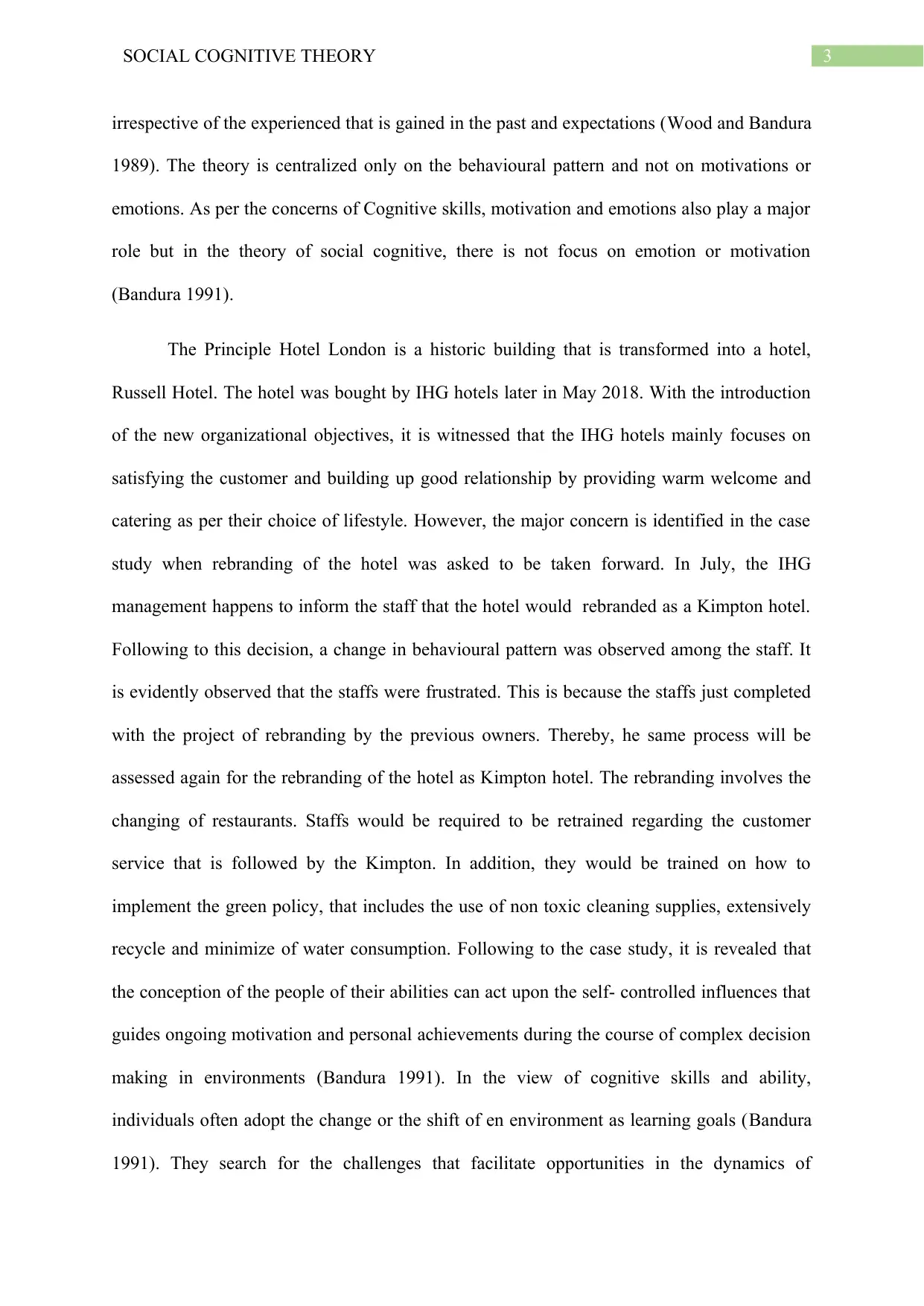
3SOCIAL COGNITIVE THEORY
irrespective of the experienced that is gained in the past and expectations (Wood and Bandura
1989). The theory is centralized only on the behavioural pattern and not on motivations or
emotions. As per the concerns of Cognitive skills, motivation and emotions also play a major
role but in the theory of social cognitive, there is not focus on emotion or motivation
(Bandura 1991).
The Principle Hotel London is a historic building that is transformed into a hotel,
Russell Hotel. The hotel was bought by IHG hotels later in May 2018. With the introduction
of the new organizational objectives, it is witnessed that the IHG hotels mainly focuses on
satisfying the customer and building up good relationship by providing warm welcome and
catering as per their choice of lifestyle. However, the major concern is identified in the case
study when rebranding of the hotel was asked to be taken forward. In July, the IHG
management happens to inform the staff that the hotel would rebranded as a Kimpton hotel.
Following to this decision, a change in behavioural pattern was observed among the staff. It
is evidently observed that the staffs were frustrated. This is because the staffs just completed
with the project of rebranding by the previous owners. Thereby, he same process will be
assessed again for the rebranding of the hotel as Kimpton hotel. The rebranding involves the
changing of restaurants. Staffs would be required to be retrained regarding the customer
service that is followed by the Kimpton. In addition, they would be trained on how to
implement the green policy, that includes the use of non toxic cleaning supplies, extensively
recycle and minimize of water consumption. Following to the case study, it is revealed that
the conception of the people of their abilities can act upon the self- controlled influences that
guides ongoing motivation and personal achievements during the course of complex decision
making in environments (Bandura 1991). In the view of cognitive skills and ability,
individuals often adopt the change or the shift of en environment as learning goals (Bandura
1991). They search for the challenges that facilitate opportunities in the dynamics of
irrespective of the experienced that is gained in the past and expectations (Wood and Bandura
1989). The theory is centralized only on the behavioural pattern and not on motivations or
emotions. As per the concerns of Cognitive skills, motivation and emotions also play a major
role but in the theory of social cognitive, there is not focus on emotion or motivation
(Bandura 1991).
The Principle Hotel London is a historic building that is transformed into a hotel,
Russell Hotel. The hotel was bought by IHG hotels later in May 2018. With the introduction
of the new organizational objectives, it is witnessed that the IHG hotels mainly focuses on
satisfying the customer and building up good relationship by providing warm welcome and
catering as per their choice of lifestyle. However, the major concern is identified in the case
study when rebranding of the hotel was asked to be taken forward. In July, the IHG
management happens to inform the staff that the hotel would rebranded as a Kimpton hotel.
Following to this decision, a change in behavioural pattern was observed among the staff. It
is evidently observed that the staffs were frustrated. This is because the staffs just completed
with the project of rebranding by the previous owners. Thereby, he same process will be
assessed again for the rebranding of the hotel as Kimpton hotel. The rebranding involves the
changing of restaurants. Staffs would be required to be retrained regarding the customer
service that is followed by the Kimpton. In addition, they would be trained on how to
implement the green policy, that includes the use of non toxic cleaning supplies, extensively
recycle and minimize of water consumption. Following to the case study, it is revealed that
the conception of the people of their abilities can act upon the self- controlled influences that
guides ongoing motivation and personal achievements during the course of complex decision
making in environments (Bandura 1991). In the view of cognitive skills and ability,
individuals often adopt the change or the shift of en environment as learning goals (Bandura
1991). They search for the challenges that facilitate opportunities in the dynamics of
Paraphrase This Document
Need a fresh take? Get an instant paraphrase of this document with our AI Paraphraser
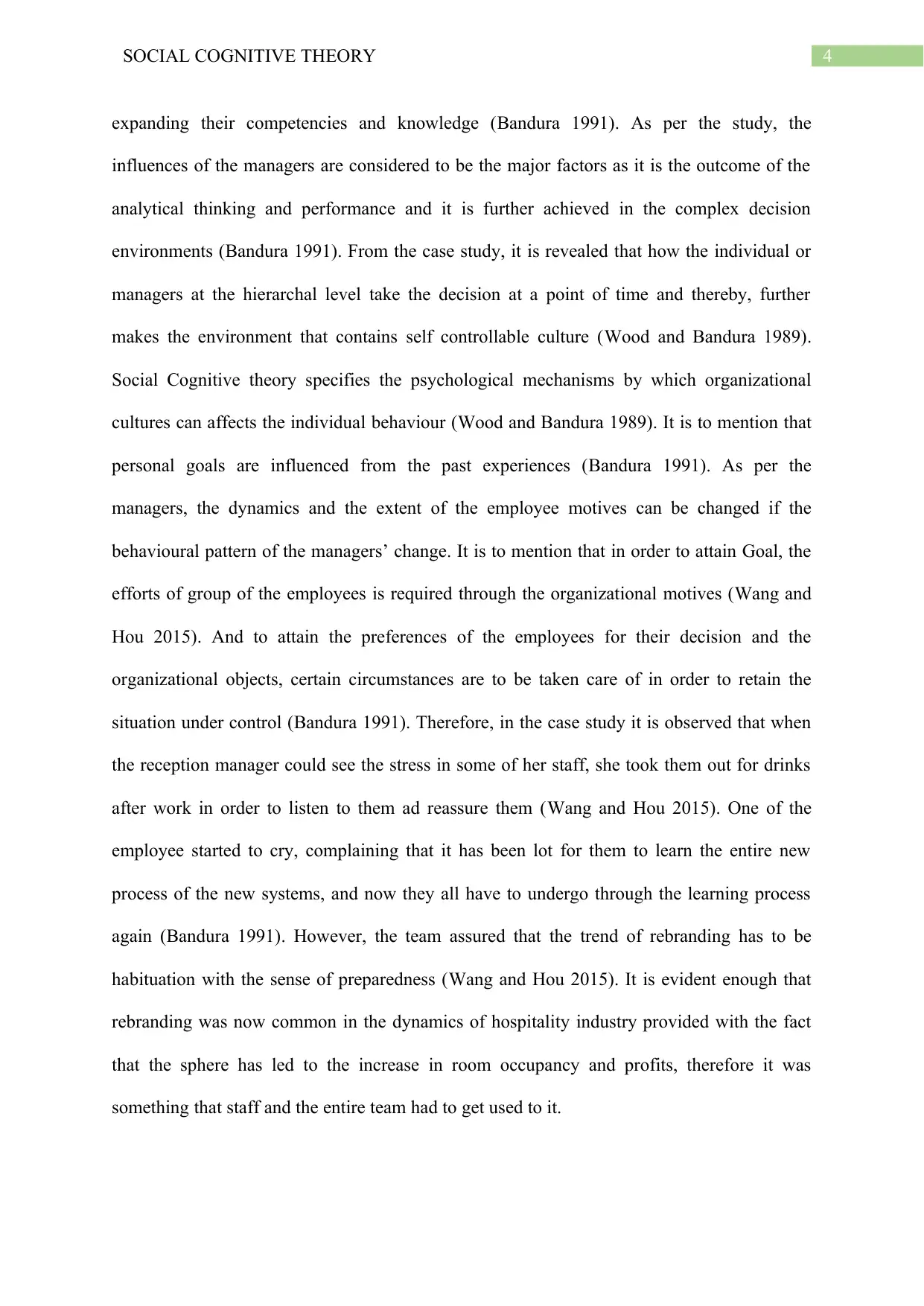
4SOCIAL COGNITIVE THEORY
expanding their competencies and knowledge (Bandura 1991). As per the study, the
influences of the managers are considered to be the major factors as it is the outcome of the
analytical thinking and performance and it is further achieved in the complex decision
environments (Bandura 1991). From the case study, it is revealed that how the individual or
managers at the hierarchal level take the decision at a point of time and thereby, further
makes the environment that contains self controllable culture (Wood and Bandura 1989).
Social Cognitive theory specifies the psychological mechanisms by which organizational
cultures can affects the individual behaviour (Wood and Bandura 1989). It is to mention that
personal goals are influenced from the past experiences (Bandura 1991). As per the
managers, the dynamics and the extent of the employee motives can be changed if the
behavioural pattern of the managers’ change. It is to mention that in order to attain Goal, the
efforts of group of the employees is required through the organizational motives (Wang and
Hou 2015). And to attain the preferences of the employees for their decision and the
organizational objects, certain circumstances are to be taken care of in order to retain the
situation under control (Bandura 1991). Therefore, in the case study it is observed that when
the reception manager could see the stress in some of her staff, she took them out for drinks
after work in order to listen to them ad reassure them (Wang and Hou 2015). One of the
employee started to cry, complaining that it has been lot for them to learn the entire new
process of the new systems, and now they all have to undergo through the learning process
again (Bandura 1991). However, the team assured that the trend of rebranding has to be
habituation with the sense of preparedness (Wang and Hou 2015). It is evident enough that
rebranding was now common in the dynamics of hospitality industry provided with the fact
that the sphere has led to the increase in room occupancy and profits, therefore it was
something that staff and the entire team had to get used to it.
expanding their competencies and knowledge (Bandura 1991). As per the study, the
influences of the managers are considered to be the major factors as it is the outcome of the
analytical thinking and performance and it is further achieved in the complex decision
environments (Bandura 1991). From the case study, it is revealed that how the individual or
managers at the hierarchal level take the decision at a point of time and thereby, further
makes the environment that contains self controllable culture (Wood and Bandura 1989).
Social Cognitive theory specifies the psychological mechanisms by which organizational
cultures can affects the individual behaviour (Wood and Bandura 1989). It is to mention that
personal goals are influenced from the past experiences (Bandura 1991). As per the
managers, the dynamics and the extent of the employee motives can be changed if the
behavioural pattern of the managers’ change. It is to mention that in order to attain Goal, the
efforts of group of the employees is required through the organizational motives (Wang and
Hou 2015). And to attain the preferences of the employees for their decision and the
organizational objects, certain circumstances are to be taken care of in order to retain the
situation under control (Bandura 1991). Therefore, in the case study it is observed that when
the reception manager could see the stress in some of her staff, she took them out for drinks
after work in order to listen to them ad reassure them (Wang and Hou 2015). One of the
employee started to cry, complaining that it has been lot for them to learn the entire new
process of the new systems, and now they all have to undergo through the learning process
again (Bandura 1991). However, the team assured that the trend of rebranding has to be
habituation with the sense of preparedness (Wang and Hou 2015). It is evident enough that
rebranding was now common in the dynamics of hospitality industry provided with the fact
that the sphere has led to the increase in room occupancy and profits, therefore it was
something that staff and the entire team had to get used to it.
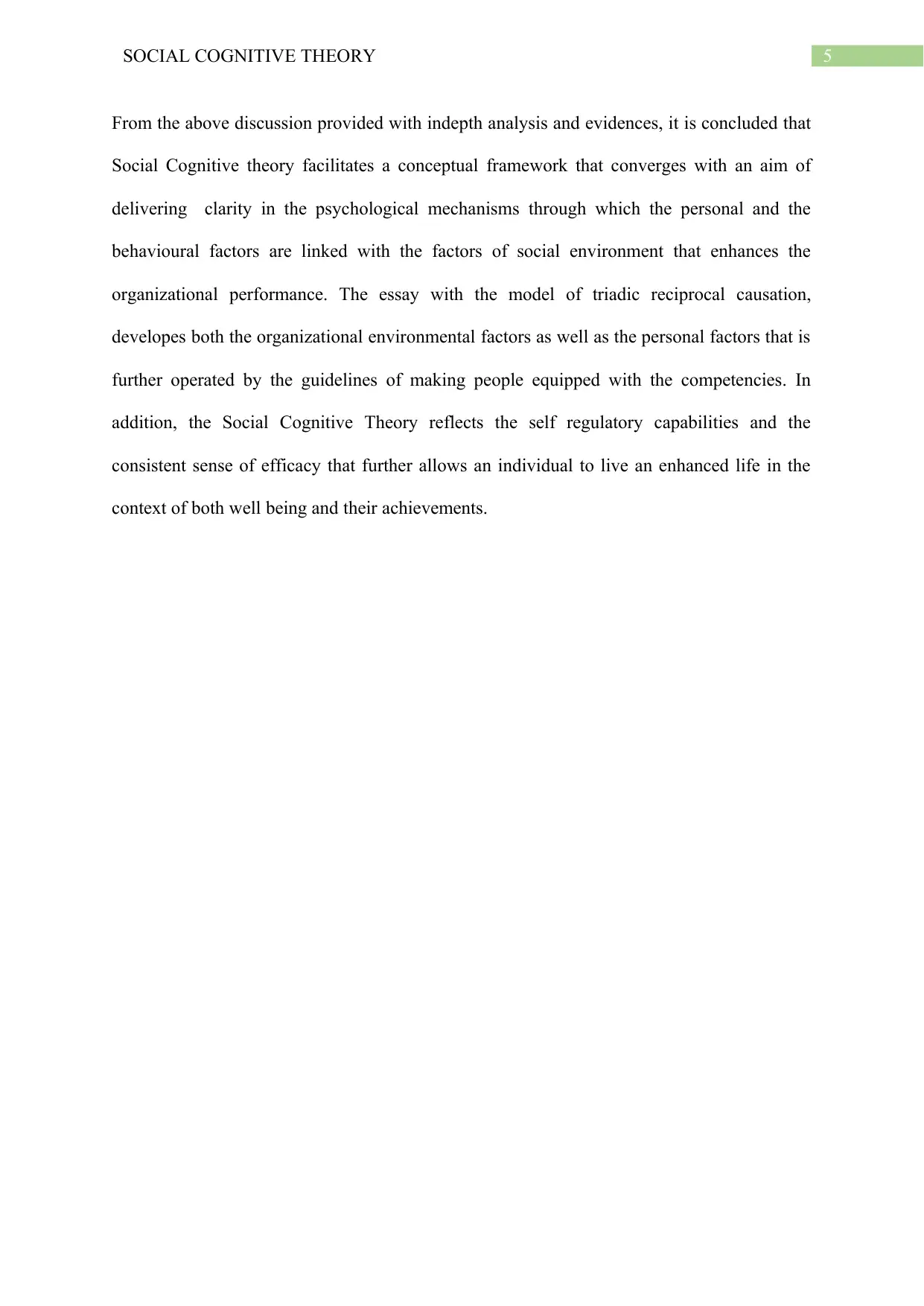
5SOCIAL COGNITIVE THEORY
From the above discussion provided with indepth analysis and evidences, it is concluded that
Social Cognitive theory facilitates a conceptual framework that converges with an aim of
delivering clarity in the psychological mechanisms through which the personal and the
behavioural factors are linked with the factors of social environment that enhances the
organizational performance. The essay with the model of triadic reciprocal causation,
developes both the organizational environmental factors as well as the personal factors that is
further operated by the guidelines of making people equipped with the competencies. In
addition, the Social Cognitive Theory reflects the self regulatory capabilities and the
consistent sense of efficacy that further allows an individual to live an enhanced life in the
context of both well being and their achievements.
From the above discussion provided with indepth analysis and evidences, it is concluded that
Social Cognitive theory facilitates a conceptual framework that converges with an aim of
delivering clarity in the psychological mechanisms through which the personal and the
behavioural factors are linked with the factors of social environment that enhances the
organizational performance. The essay with the model of triadic reciprocal causation,
developes both the organizational environmental factors as well as the personal factors that is
further operated by the guidelines of making people equipped with the competencies. In
addition, the Social Cognitive Theory reflects the self regulatory capabilities and the
consistent sense of efficacy that further allows an individual to live an enhanced life in the
context of both well being and their achievements.
⊘ This is a preview!⊘
Do you want full access?
Subscribe today to unlock all pages.

Trusted by 1+ million students worldwide
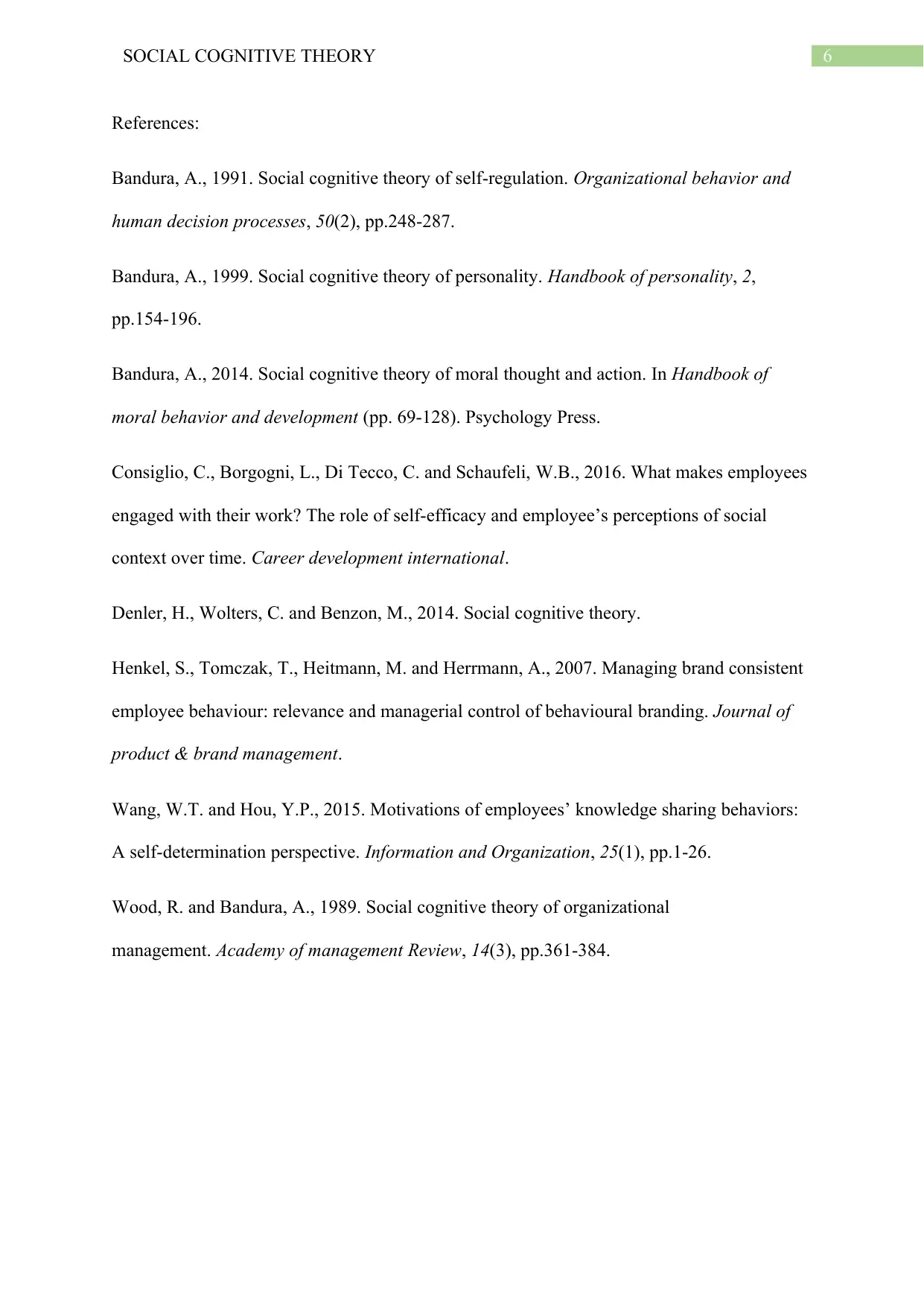
6SOCIAL COGNITIVE THEORY
References:
Bandura, A., 1991. Social cognitive theory of self-regulation. Organizational behavior and
human decision processes, 50(2), pp.248-287.
Bandura, A., 1999. Social cognitive theory of personality. Handbook of personality, 2,
pp.154-196.
Bandura, A., 2014. Social cognitive theory of moral thought and action. In Handbook of
moral behavior and development (pp. 69-128). Psychology Press.
Consiglio, C., Borgogni, L., Di Tecco, C. and Schaufeli, W.B., 2016. What makes employees
engaged with their work? The role of self-efficacy and employee’s perceptions of social
context over time. Career development international.
Denler, H., Wolters, C. and Benzon, M., 2014. Social cognitive theory.
Henkel, S., Tomczak, T., Heitmann, M. and Herrmann, A., 2007. Managing brand consistent
employee behaviour: relevance and managerial control of behavioural branding. Journal of
product & brand management.
Wang, W.T. and Hou, Y.P., 2015. Motivations of employees’ knowledge sharing behaviors:
A self-determination perspective. Information and Organization, 25(1), pp.1-26.
Wood, R. and Bandura, A., 1989. Social cognitive theory of organizational
management. Academy of management Review, 14(3), pp.361-384.
References:
Bandura, A., 1991. Social cognitive theory of self-regulation. Organizational behavior and
human decision processes, 50(2), pp.248-287.
Bandura, A., 1999. Social cognitive theory of personality. Handbook of personality, 2,
pp.154-196.
Bandura, A., 2014. Social cognitive theory of moral thought and action. In Handbook of
moral behavior and development (pp. 69-128). Psychology Press.
Consiglio, C., Borgogni, L., Di Tecco, C. and Schaufeli, W.B., 2016. What makes employees
engaged with their work? The role of self-efficacy and employee’s perceptions of social
context over time. Career development international.
Denler, H., Wolters, C. and Benzon, M., 2014. Social cognitive theory.
Henkel, S., Tomczak, T., Heitmann, M. and Herrmann, A., 2007. Managing brand consistent
employee behaviour: relevance and managerial control of behavioural branding. Journal of
product & brand management.
Wang, W.T. and Hou, Y.P., 2015. Motivations of employees’ knowledge sharing behaviors:
A self-determination perspective. Information and Organization, 25(1), pp.1-26.
Wood, R. and Bandura, A., 1989. Social cognitive theory of organizational
management. Academy of management Review, 14(3), pp.361-384.
1 out of 7
Related Documents
Your All-in-One AI-Powered Toolkit for Academic Success.
+13062052269
info@desklib.com
Available 24*7 on WhatsApp / Email
![[object Object]](/_next/static/media/star-bottom.7253800d.svg)
Unlock your academic potential
Copyright © 2020–2026 A2Z Services. All Rights Reserved. Developed and managed by ZUCOL.





